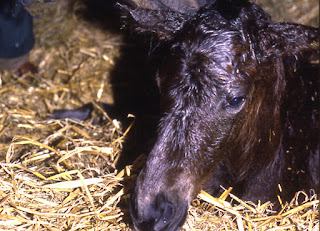in Warmbloods. However, a recent study has found that the genetic defect responsible is present across a range of other breeds.
Affected foals are typically aborted during late gestation or born as non-viable foals. If alive at birth, they tend to have problems such as fragile skin, skin defects, hyperextension of the joints and difficulty breathing, and generally require euthanasia within days.
FFS has been shown to be an autosomal recessive genetic condition. Carrier animals with one copy of the defective gene (PLOD 1 c.2032 G>A) will be normal, but if mated with another carrier may produce an affected foal.
It is now known that the condition is not confined to Warmblood horses.
Research by Katie Martin and colleagues at Etalon diagnostics (a company that offers genetic testing), together with Dr Samantha Brooks at the University of Florida Gainesville and Dr Scott Mclure, of Midwest Equine, Iowa, found that the genetic defect occurs across other horse populations.
The team examined samples from 7343 horses from various breeds or type of horse.
The defective gene occurred in 5.32% of Warmblood type horses. In other affected breeds it was less than 1%. They found no sign of the defect in Arabians, Iberian or Thoroughbreds.
Studies of the frequency of the defect in aborted or stillborn foals are lacking, so
the potential economic effect of FFS on the horse breeding industry is not known.
The researchers suggest that pre-breeding testing should be used to inform the breeding program – avoiding breeding two carriers, together to reduce the frequency of the FFS gene in the population, and reduce the number of lost pregnancies.
For more details, see:
Fragile Foal Syndrome (PLOD1 c.2032G>A) occurs across diverse horse populations
Katie Martin, Samantha Brooks, Micaela Vierra, W. Tyler Lafayette, Scott McClure, Meredith Carpenter and Christa Lafayette
Animal Genetics (2021) vol 52, p137.


No comments:
Post a Comment